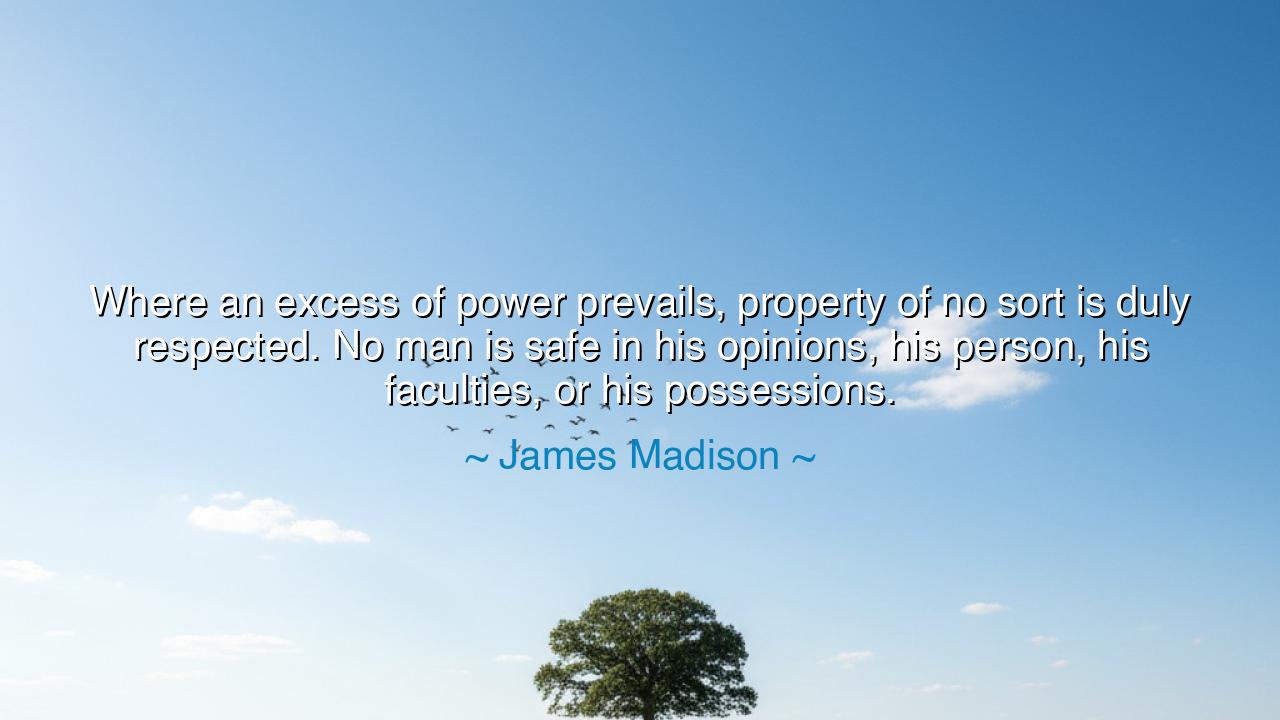
Where an excess of power prevails, property of no sort is duly
Where an excess of power prevails, property of no sort is duly respected. No man is safe in his opinions, his person, his faculties, or his possessions.






When power grows unchecked, it becomes a devouring flame that consumes all in its path. James Madison, the father of the American Constitution, warned of this truth when he declared, “Where an excess of power prevails, property of no sort is duly respected. No man is safe in his opinions, his person, his faculties, or his possessions.” His words are not merely about wealth or material things, but about the very essence of freedom. For when rulers or governments rise beyond proper bounds, nothing sacred remains protected—not thought, not body, not spirit.
Property, in Madison’s time, meant far more than land or gold. It encompassed a person’s ideas, labor, talents, and dignity. When power is balanced, these are sheltered by laws and justice. But when power grows wild and excessive, it tramples these protections underfoot. Tyrants, fearing free thought, seek to silence opinions. They demand loyalty not through love but through fear. Thus, no man is truly safe, for even his mind becomes the property of the state.
History offers a stark reminder in the tale of the French Revolution. At first, the people rose against oppression with noble ideals of liberty and equality. Yet as the revolution spiraled, excessive power gathered in the hands of a few, and soon the guillotine ruled the land. Citizens were condemned not for crimes, but for their beliefs, their words, even their associations. The possessions of the wealthy were seized, but worse still, the faculties of the people—their right to think and speak freely—were destroyed. This descent into chaos fulfilled Madison’s warning: without limits, power becomes a beast that devours even its masters.
Madison himself lived through the birth of a new nation and understood the delicate balance between liberty and authority. The Constitution of the United States was crafted as a shield against excessive power, dividing authority among branches and protecting individual rights. Madison knew that a government strong enough to protect its people must also be restrained, lest it turn against them. His vision was not merely for his own time, but for all ages and nations.
Let this wisdom echo through the centuries: guard against the excess of power, whether in kings, assemblies, or mobs. Freedom is not lost in a single dramatic moment, but in the slow erosion of rights and respect. When even one person’s opinions or faculties are violated, all are imperiled. A just society must ensure that its rulers are servants, not masters, and that property, in all its forms, is sacred. For only in balance can a people live secure, and only through vigilance can the flame of liberty endure.






NT8/3-46_Vo Thi Ngoc Tram
This quote prompts reflection on the fragility of personal and property rights under concentrated power. It seems to imply that freedom is never guaranteed unless power is carefully distributed and restrained. How can legal systems, cultural norms, and ethical leadership work together to ensure that individuals feel safe expressing opinions and owning property? I’d like a perspective on how societies have successfully resisted the corruption of authority while maintaining order and security.
NMCao Thi Nhat Minh
I feel alarmed reading this because it suggests that the accumulation of power can compromise every aspect of human security, from physical safety to intellectual liberty. It makes me question whether citizens are sufficiently aware of power imbalances in their own governments. What role do transparency, checks and balances, and civic education play in preventing abuses of authority? Could constant public engagement act as a safeguard against these dangers?
DTDao Trinh
This statement raises questions about the relationship between power, law, and morality. If no one is safe under excessive authority, how do individuals navigate environments where dissent is dangerous? Are there ethical strategies to resist such power without endangering oneself? I also wonder whether technology and surveillance in contemporary societies exacerbate this issue, making Madison’s warning even more relevant today.
VTVinh Tieu
Reading this evokes a sense of caution and urgency. It highlights how concentrated power can erode not just property, but personal autonomy and intellectual freedom. I’m curious about historical examples where excessive authority led to widespread suppression of rights. How can modern societies prevent similar outcomes? Does this warning imply that even democratic systems are vulnerable if power is allowed to concentrate beyond certain limits?
TNNguyen Thi Thanh Nhan
This quote makes me reflect on the dangers of unchecked power and its effects on individual freedom. How often do societies fail to recognize the gradual accumulation of excessive authority until rights are already compromised? I wonder what mechanisms are most effective in ensuring that power remains balanced and accountable. Can legal safeguards and democratic institutions alone protect personal opinions, property, and safety, or does it require active civic vigilance from citizens?